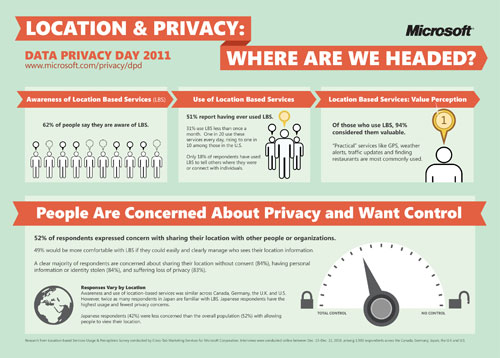SAN FRANCISCO – Jan. 26, 2011 – For many people, the smartphone is center stage for their digital lives. It’s how they work and play, connect and share.
In the process, their device might be leaving behind an electronic breadcrumb trail. We are now seeing an explosion in new technologies and location-based services that track, analyze and share our movements, said Brendon Lynch, Microsoft’s chief privacy officer. These services are innovative and clearly beneficial, he said, but people need to understand the privacy implications when they “check in” to their favorite places.
“Our customers care deeply about this,” he said. “As the technology industry and Microsoft’s products and service offerings evolve, personal information is clearly at forefront of all of this.”
In concert with Data Privacy Day this Friday, January 28, Microsoft today is releasing new research that examines consumer awareness of location-based services and privacy. It also is hosting a panel discussion with the Churchill Club in San Francisco, where key industry and consumer groups, academics and public policy organizations will explore the privacy implications of the new technologies.
With the research, which is based on a survey of 1,500 people from the U.S., United Kingdom, Canada, Japan and Germany, Microsoft aims to raise awareness and provide guidance to help consumers manage their privacy, and to provide businesses with better privacy tools for location-based services, Lynch said. The key takeaway from the study is that while people clearly see the benefits of location-based services, they also are concerned about their privacy and are eager for more control.

New research shows that as more people use and become aware of location-based services, they are growing concerned about sharing information about themselves.
Giving people control over their information is at the heart of Microsoft’s work around privacy, Lynch said. He heads up Microsoft’s privacy efforts, which involve some 400 employees from around the company building privacy into products and features, partnering with privacy advocates and the wider technology industry, and providing privacy and safety guidance to consumers.
The desire by consumers for transparency and control underscores the need for the technology industry, including location-based service providers, to adopt the principles of “Privacy by Design,” Lynch said. Microsoft has strong privacy standards that govern the development and deployment of its products and services. Those standards include detailed guidance on creating customer notification and consent procedures, providing sufficient data security features, maintaining data integrity, and supplying controls.

Brendon Lynch, Microsoft’s chief privacy officer.
Several high-profile Microsoft products showcase the company’s “Privacy by Design” approach, Lynch said. Take Kinect. On the surface, the Xbox 360 game sensor might introduce new privacy issues – it recognizes faces, it measures body types, it takes photos. But the product team worked diligently to make sure none of the biometric information stored by Kinect will leave the home, and users must explicitly opt-in if they want to share their photos, Lynch said.
Internet Explorer is another product with a strong focus on privacy, he added. Users have long had the ability to control cookies through the browser, and in Internet Explorer 8, Microsoft introduced In Private Browsing, where people can surf and leave no trace on their PC. Lynch said the upcoming Internet Explorer 9 release candidate will take things a step forward with Tracking Protection Lists, a tool that will let people stop a site they are visiting from sharing their information with other sites.
Lynch said that such efforts are critical to the company’s success, and not just in the consumer space. Microsoft has made major bets on cloud computing, and enterprise companies have the same worries as consumers about the safety of their information.
“The stakes are high,” Lynch said. “It’s core to Microsoft’s business success that we adequately manage and protect the security and privacy of personal information.”
For Data Privacy Day, Microsoft will highlight the work its privacy professionals do year-round. Lynch noted that members of his team come from a range of backgrounds; some from the marketing side, others from the legal side. He came to privacy from the business consulting world. Before joining Microsoft in 2004, Lynch spent 10 years at PricewaterhouseCoopers, in the risk management practice. His work covered a range of topics, but sometime around 2000 he became specifically focused on advising companies on how to manage privacy.
At that time the Internet was still in the early stages of broad adoption, he said. Some very interesting privacy issues were bubbling up with the emergence of new online advertising models like behavioral targeting, where users would see ads based on their surfing.
“It was a very quick deep dive into really understanding that some of these technology advances were pushing up against people’s perceptions of what privacy was and how things should be protected,” he said.
Since those early issues surfaced, Lynch now sees privacy concerns along a continuum. Privacy issues will still make headlines when, say, a high-profile site gets some heat over a change in privacy settings. But companies like Microsoft must constantly communicate with consumers about privacy and what they can do to manage their information.
“As people use the Internet in new ways and share more of their lives online through multiple devices, privacy needs and concerns have also evolved,” Lynch said. “That’s why Microsoft and other technology leaders must work to help consumers understand the risks posed by information sharing.”
For Data Privacy Day, Lynch and his fellow privacy managers around the world are asking everyone who goes online to “Think Privacy” and better inform themselves about the issue.




